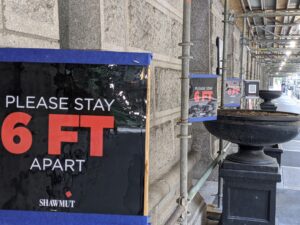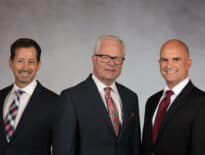
Signs mark locations where workers waiting to enter the Langham Hotel in Boston’s Financial District should stand to maintain social distancing. Renovations to the hotel were among the local construction projects halted by the COVID-19 shutdown. Photo by James Sanna | Banker & Tradesman Staff
Massachusetts has not yet experienced a confirmed post-holiday COVID surge on par with the one that followed Thanksgiving, Gov. Charlie Baker said Monday, but he cautioned that conditions could still change rapidly.
Baker’s Monday press conference fell 10 days after Christmas, and he described the span’s impact as “different” than the same period after Thanksgiving. Between Dec. 26 and Jan. 4, the average positive test rate minus higher education repeat tests increased from 7.35 percent to 9.28 percent. From Nov. 27 to Dec. 4, that rate climbed from 4.86 percent to 7.48 percent.
“I think the Thanksgiving thing was worse than this, but this isn’t over yet because we’re just a little bit past New Year’s,” Baker said. “The thing that troubles us all the most is since Thanksgiving, the average age of the people who are being hospitalized has increased dramatically, and that has real consequences with respect to life and death.”
That average age figure has increased from about 60 in early November to 73 now, Baker said.
“If you talk to any folks in the health care world, they’ll tell you that that’s the thing that’s most distressing to them as well.”
Baker has indicated he will decide later this week whether to extend his Dec. 22 order lowering capacity at many businesses to 25 percent, which is set to run through at least noon on Sunday, Jan. 10.
“We’ll probably be back sometime toward the end of the week, based on the data, to make a decision about whether or not to extend the current … orders that are in place beyond Jan. 10,” Baker said when asked about the capacity limits.
Baker issued the order in hopes of reducing crowds and opportunities for COVID-19 to spread around the Christmas and New Year holidays.
“Our hospitals are now under significant pressure and we’re heading toward another period, this holiday stretch, where we’re likely to see another significant increase in cases and hospitalizations unless everybody plays a very different game than the one we all played at Thanksgiving,” he said at the time. “As a result, we think it’s appropriate to take action now to slow that spread. And we must do so in a way that can avoid overriding our hospital system.”




 |
| 

